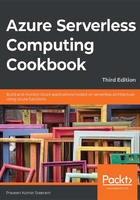
About Azure Serverless Computing Cookbook, Third Edition
This third edition of Azure Serverless Computing Cookbook guides you through the development of a basic back-end web API that performs simple operations, helping you understand how to persist data in Azure Storage services. You'll cover the integration of Azure Functions with other cloud services, such as notifications (SendGrid and Twilio), Cognitive Services (computer vision), and Logic Apps, to build simple workflow-based applications.
With the help of this book, you'll be able to leverage Visual Studio tools to develop, build, test, and deploy Azure functions quickly. It also covers a variety of tools and methods for testing the functionality of Azure functions locally in the developer's workstation and in the cloud environment. Once you're familiar with the core features, you'll explore advanced concepts such as durable functions, starting with a "hello world" example, and learn about the scalable bulk upload use case, which uses durable function patterns, function chaining, and fan-out/fan-in.
By the end of this Azure book, you'll have gained the knowledge and practical experience needed to be able to create and deploy Azure applications on serverless architectures efficiently.
About the author
Praveen Kumar Sreeram is an author, Microsoft Certified Trainer, and certified Azure Solutions Architect. He has over 15 years of experience in the field of development, analysis, design, and the delivery of applications of various technologies. His projects range from custom web development using ASP.NET and MVC to building mobile apps using the cross-platform Xamarin technology for domains such as insurance, telecom, and wireless expense management. He has been given the Most Valuable Professional award twice by one of the leading social community websites, CSharpCorner, for his contributions to the Microsoft Azure community through his articles. Praveen is highly focused on learning about technology, and blogs about his learning regularly. You can also follow him on Twitter at @PrawinSreeram. Currently, his focus is on analyzing business problems and providing technical solutions for various projects related to Microsoft Azure and .NET Core.
First of all, my thanks go to the Packt Publishing team, including Mamta Yadav, Arijit Sarkar, and Rahul Hande.
I would also like to express my deepest gratitude to A. Janardhan Setty, A. Vara Lakshmi and their family for all the support.
Thanks to Vijay Raavi, Ashis Nayak, and Manikanta Arrepu for their support in technical aspects.
About the reviewers
Stefano Demiliani is a Microsoft MVP in Business Applications, a Microsoft Certified DevOps Engineer and Azure Architect, and a long-time expert on Microsoft technologies. He works as a CTO for EID NAVLAB and his main activities are architecting solutions with Azure and Dynamics 365 ERP. He's the author of many IT books for Packt and a speaker on international conferences about Azure and Dynamics 365. You can reach him on Twitter or on LinkedIn.
Greg Leonardo is a veteran, father, developer, architect, teacher, speaker, and early adopter. He is currently a cloud architect helping organizations with cloud adoption and innovation. He has been working in the IT industry since his time in the military. He has worked in many facets of IT throughout his career. He is the president of TampaDev, a community meetup that runs #TampaCC, Azure User Group, Azure Medics, and various technology events throughout Tampa.
Kasam Shaikh, a Microsoft Certified Cloud Advocate, is a seasoned professional with a "can-do" attitude, having 13 years of demonstrated industry experience working as a cloud architect with one of the leading IT companies in Mumbai, India. He is the author of two best-selling books on Microsoft Azure and AI. He is also recognized as an MVP by a leading online community, C# Corner, and is also a global AzureAI speaker. He presents his tech-dose at KasamShaikh.com. He is the founder of DearAzure | Azure INDIA (AZ-INDIA) community—the fastest growing online community for learning Microsoft Azure.
Learning objectives
By the end of this book, you will be able to:
- Implement the continuous integration and continuous deployment (CI/CD) of Azure functions.
- Develop different event-based handlers in a serverless architecture.
- Integrate Azure functions with different Azure services to develop enterprise-level applications.
- Accelerate your cloud application development using Azure function triggers and bindings.
- Automate mundane tasks at various levels, from development to deployment and maintenance.
- Develop stateful serverless applications and self-healing jobs using durable functions.
Audience
If you are a cloud developer or architect who wants to build cloud-native systems and deploy serverless applications with Azure functions, this book is for you. Prior experience with Microsoft Azure core services will help you to make the most of this book.
Approach
This cookbook covers every aspect of serverless computing with Azure with a perfect blend of theory, hands-on coding, and helpful recipes. It contains several examples that use real-life business scenarios for you to practice and apply your new skills in a highly relevant context.
Hardware and software requirements
For an optimal learning experience, we recommend the following configuration:
- Visual Studio 2019
- Storage Explorer
- Azure Functions Core Tools (formerly Azure CLI Tools)
- Processor: Intel Core i5 or equivalent
- Memory: 4 GB RAM (8 GB preferred)
- Storage: 35 GB available space
Conventions
Code words in the text, database table names, folder names, filenames, file extensions, pathnames, dummy URLs, user input, and Twitter handles are shown as follows:
"In this BlobTriggerCSharp class, the Run method has the WebJobs attribute with a connection string (in this case, it is AzureWebJobsStorage)."
Here's a sample block of code:
Install-Package Microsoft.Azure.Services.AppAuthentication
On many occasions, we have used angled brackets, <>. You need to replace these with the actual parameter, and not use these brackets within the commands.
Download resources
The code bundle for this book is also hosted on GitHub at https://github.com/PacktPublishing/Azure-Serverless-Computing-Cookbook-Third-Edition. You can find the YAML and other files used in this book, which are referred to at relevant instances.
We also have other code bundles from our rich catalog of books and videos available at https://github.com/PacktPublishing/. Check them out!